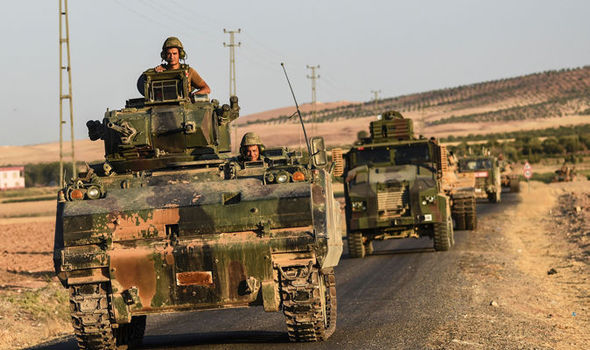-
Tips for becoming a good boxer - November 6, 2020
-
7 expert tips for making your hens night a memorable one - November 6, 2020
-
5 reasons to host your Christmas party on a cruise boat - November 6, 2020
-
What to do when you’re charged with a crime - November 6, 2020
-
Should you get one or multiple dogs? Here’s all you need to know - November 3, 2020
-
A Guide: How to Build Your Very Own Magic Mirror - February 14, 2019
-
Our Top Inspirational Baseball Stars - November 24, 2018
-
Five Tech Tools That Will Help You Turn Your Blog into a Business - November 24, 2018
-
How to Indulge on Vacation without Expanding Your Waist - November 9, 2018
-
5 Strategies for Businesses to Appeal to Today’s Increasingly Mobile-Crazed Customers - November 9, 2018
ISIS Expelled From Border, Turkey-Backed Rebels Seize 20 Villages
On Sunday, they took control of the villages of Ganime and Suveya, west of Jarabulus, as well as Kadikoy (El Kadi), the last Daesh-controlled village along the Turkish-Syrian border.
Advertisement
The Free Syrian Army (FSA) pushed Daesh terrorists from all captured areas at the Syrian-Turkish border, Anadolu news agency reported citing military sources.
“The Turkish border with Syria was cleared Sunday of Daesh terrorists”, Anadolu reported.
The FSA’s advance shut down key supply lines used by the Islamic State to bring in foreign fighters, weapons, and ammunition.
Some 5,000 US and Turkish-backed Syrian rebels have crossed into northern Syria from Turkey to participate in the so-called Euphrates Shield operation, according to local journalist Adnan al-Hussein, who is embedded with the groups.
Ankara sees the YPG and PYD as offshoots of its home-grown Kurdistan Workers’ Party, which was labeled as a terror group by Turkey, the United States and the European Union for its decades-old armed struggle for autonomy in southeastern Turkey.
Meanwhile, Syrian government forces are reportedly advancing near Aleppo in an attempt to besiege rebel-held parts of the northern city.
A deal would depend on Moscow using its influence with Syrian President Bashar Assad to persuade him to ground planes and stop the assault on opposition forces.
The Turkish military said that 20 ISIS targets were struck in the latest violence and that 300 ISIS targets have been hit since Operation Euphrates Shield began on August 24.
That puts Turkey in firm control of a stretch of land it sees as a bulwark against the US -backed Syrian Kurdish YPG militia.
A Turkish tank on its way to the Syrian border.
Turkey’s PM has said Syrian rebels backed by its military have driven out “all terrorist organisations” from a strip of Syrian land bordering Turkey.
The Kurdish YPG is an effective force also fighting so-called Islamic State in Syria, but worries Turkey because fighters want their own Kurdish homeland.
In early August, rebel forces including Al-Qaeda’s former Syrian affiliate battled regime forces south of the city to open a new route to the east, through Ramussa district.
The deal depends on the two sides agreeing to closer military coordination against extremist groups operating in Syria, something the Russians have long sought and the USA has resisted. The city of Homs, Syria’s third largest, is largely under government control, with only one neighborhood still held by rebels.
Ankara considers the YPG a terrorist group and has warned the USA against attempts to create an “artificial state” in northern Syria.
Turkey’s President Tayyip Erdogan, who has repeatedly said that Turkey’s allies should differentiate between Islamic State and the YPG as both groups pose a threat to Turkey, said: “It is our wish that a terror corridor not be formed across our southern border”.
Advertisement
Talks by the Cold War foes on a ceasefire were set to continue on Monday, but “we’re not there yet”, U.S. President Barack Obama told reporters at the G20 summit in the Chinese city of Hangzhou.





























